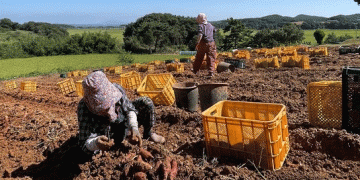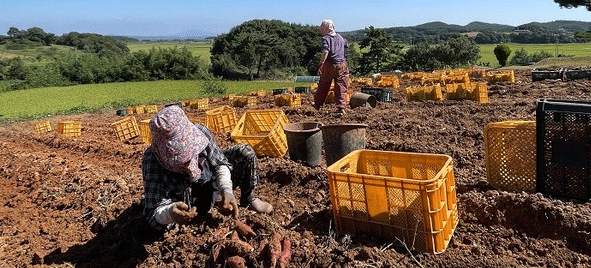In a strategic move that benefits both local agriculture and the tourism sector, Ireland Resort on Anmyeondo Island has launched a month-long “Autumn Pumpkin Sweet Potato Sales” event. This initiative, running throughout October, directly sources a local specialty—pumpkin sweet potatoes—from area farms for sale and sampling at the resort. For farmers, agronomists, and farm owners, this partnership offers a compelling blueprint for how to create premium, stable markets by integrating local produce into the tourism and hospitality experience.
The core of this model is a direct procurement channel that bypasses traditional, often volatile, supply chains. By purchasing directly from Anmyeondo farmers, the resort ensures that a greater share of the consumer dollar reaches the producer. This practice is a tangible application of ESG (Environmental, Social, and Governance) principles, specifically the ‘Social’ component, which focuses on supporting local communities. The resort is not merely buying a commodity; it is investing in the regional agricultural identity, promoting the “Anmyeondo specialty” as a key part of the guest experience. This aligns with global trends; a 2023 report by the World Travel & Tourism Council (WTTC) highlights that travelers are increasingly seeking authentic, local experiences, with a growing demand for locally sourced food in hospitality settings.
Furthermore, the resort enhances the value of the raw product through experiential marketing. The free tasting events of roasted sweet potatoes in the resort’s lobby and plaza, especially during the peak travel period of the Chuseok holiday, serve as a powerful promotional tool. This “try before you buy” approach introduces the high-quality product to a captive audience of potential customers from across the country, effectively building brand recognition for Anmyeondo pumpkin sweet potatoes. This strategy of creating an “experience” around a local product is a proven method for building consumer loyalty and justifying a premium price point.
This is part of a broader, long-term strategy by the resort, which also sells other local products like salt, seaweed, and honey ginger syrup. This establishes a sustainable “shared growth model” that moves beyond one-off transactions. For agricultural engineers and scientists, this underscores the importance of producing not just high-yielding crops, but also high-quality, consistent, and unique varieties that can become regional trademarks and command a place in such value-added markets.
The Ireland Resort case study provides a clear and replicable strategy for strengthening agricultural livelihoods. It demonstrates that the future of farm profitability often lies in strategic partnerships beyond the farm gate. For farmers and cooperatives, the lesson is to proactively engage with local tourism boards, hotels, and resorts to create direct sales channels. For resort owners and agricultural policymakers, it shows that investing in local food procurement is not just corporate social responsibility—it is a smart business strategy that enhances the guest experience, supports the regional economy, and builds a resilient, distinctive brand. By fostering such synergies, the agricultural and tourism sectors can grow together, creating a more sustainable and prosperous future for rural communities.































